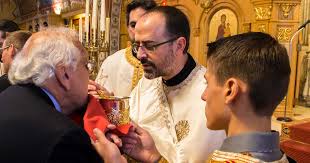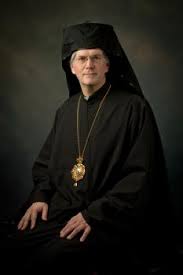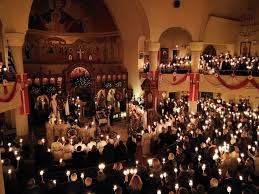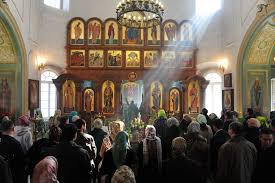Preparation for Holy Communion
We covered The Proskomidia Service (Priest’s Preparation for Divine Liturgy) in Posts 151 and 152. The moral of this was that all of us, not only the clergy, should make special preparations if we’re going to receive the Holy Eucharist – which I hope you do regularly, unless you’re in sin and unrepentant, God help you.  You should, of course, approach the altar with a spirit of repentance. If you have any sins hanging heavy over your head, get yourself to a Priest for Confession.
You should, of course, approach the altar with a spirit of repentance. If you have any sins hanging heavy over your head, get yourself to a Priest for Confession.
You can prepare by coming to Saturday evening Vespers or to the Service before Divine Liturgy (Matins/Orthros in the Greek/Antiochian tradition, or the Morning Office in the Slavic tradition). Those who will receive the Holy Eucharist should definitely use some of the Prayers of Preparation for Holy Communion found in almost any Orthodox prayer book. Don’t just pop into church as if it was a fast food joint. This is the holy Banquet of the Lord.
P. S. A week later: I can’t believe that I neglected last week to mention the Eucharistic Fast! just took it for granted, I guess. (And for shame on you readers who never corrected me!)
We should fast from food and drink after Midnight before receiving Holy Communion. The Holy Eucharist should normally be our first food of the day and of the new week. Exceptions should be made for young children or those who are ill, pregnant or aged. The purpose of the Eucharistic Fast is not to make us ill. Use your judgment.
Now… whether you will receive the Holy Eucharist or not:
Get to Divine Liturgy on time
Here we go again, they all said. I often feel the same way – like this is a hopeless cause. But I’ll try here to do more here than just complain.
First, please know that (believe tor not!) some devout Orthodox people almost always arrive early. As do our readers and chanters at Matins, and the clergy of course. And also as do many who are new to the Orthodox Church – until they observe for a while, and then some of them also start ambling in later and later in the good * old Orthodox way. Lord have mercy.
- bad
Of course there can be extenuating circumstances: getting little children ready, traffic delays, icy roads. Also those of us who are “ancient of days” find that everything takes twice as long as it used to, which drives me crazy. (The other Sunday I planned to get to church by 7:45, and then hurried in barely on time for 8:15 Matins.) And also if your house is on fire. But probably this isn’t why most Orthodox come late. When I inquired gently one time, a woman told me “Why, in our family we never thought about that”!
After starting Liturgy, Father David and I sometimes look out into the congregation and nervously fear  that nobody is coming, but then by the Gospel suddenly there they all are! or sometimes not even till the time of the Great Entrance. Sorry, this is a fuzzy image. Searching the internet I note that hardly anybody takes pictures of Orthodox Liturgy early in the service. I wonder why.
that nobody is coming, but then by the Gospel suddenly there they all are! or sometimes not even till the time of the Great Entrance. Sorry, this is a fuzzy image. Searching the internet I note that hardly anybody takes pictures of Orthodox Liturgy early in the service. I wonder why.
Do you want to hear an extreme example? While we were still Episcopalians and searching, my wife and I visited an Orthodox church – I won’t tell you where or of what jurisdiction. Not knowing any better, we walked in during Orthros (Matins) to find ourselves alone, except for the Priest, and his wife who was doing the chanting. During the Divine Liturgy people arrived slowly, so that by the end a fair number were there – which was how I discovered why many Priests put the homily at the end of the Liturgy. It’s so somebody will be around to hear it! And then… we went downstairs for the post-liturgical social hour, and the place was jammed! What is wrong with this picture?
I might have been almost tempted to go back to the Episcopal Church. (Except that my Bishop had fired me. Have I told you this story?) But, really, Episcopalians are genuinely embarrassed to arrive late at services. Likewise, someone told me recently that in the Baptist church where she grew up, people who arrived late sometimes just turned around and went home. That’s the other unhealthy extreme. But it does show they have more respect for the worship of God than many Orthodox do. Nor can we blame it on long Orthodox services. “Bible Baptists” tend to go on and on, too.
Conclusion: The Holy Orthodox Church is perfect in theology and worship – I sincerely believe that, after my long years of searching. But in terms of “practice”, sometimes we are very far from perfection.
 But why? Last November when our Bishop Anthony came to Saint Nicholas and was taking questions from people, I asked if he knew why Orthodox arrive late. He said he did not, but he thought maybe it was because people take Orthodoxy for granted – in a good way: For all these many centuries the Orthodox Church has been here, solid as the rock of Gibraltar, and maybe people feel they don’t have to “push it” to keep things going. Maybe. Maybe it’s like how in a long solid marriage the couple take each other’s faithfulness and love for granted. That also is a good thing. However… if my wife is always prepared for us to leave for somewhere, and I always get myself ready a half hour later, how do you suppose that would work out? Or if you regularly showed up a half hour late for work?
But why? Last November when our Bishop Anthony came to Saint Nicholas and was taking questions from people, I asked if he knew why Orthodox arrive late. He said he did not, but he thought maybe it was because people take Orthodoxy for granted – in a good way: For all these many centuries the Orthodox Church has been here, solid as the rock of Gibraltar, and maybe people feel they don’t have to “push it” to keep things going. Maybe. Maybe it’s like how in a long solid marriage the couple take each other’s faithfulness and love for granted. That also is a good thing. However… if my wife is always prepared for us to leave for somewhere, and I always get myself ready a half hour later, how do you suppose that would work out? Or if you regularly showed up a half hour late for work?
Let’s say it positively: Really, folks, why would anyone not want to receive their full weekly  immersion into the worship of God? the glory of God? the wisdom of God? receive the power of God? Why would any Christian not want to hear the Scriptures, the life-giving Gospel of our Lord Jesus Christ? The Liturgy is so beautiful, so fulfilling, so inspiring. It lifts us up into the Kingdom of Heaven.
immersion into the worship of God? the glory of God? the wisdom of God? receive the power of God? Why would any Christian not want to hear the Scriptures, the life-giving Gospel of our Lord Jesus Christ? The Liturgy is so beautiful, so fulfilling, so inspiring. It lifts us up into the Kingdom of Heaven.
Here is my personal witness: Since I have been Orthodox I have worshiped at the Divine Liturgy almost every Sunday and feast day for over thirty years now. During the twenty five years I was Anglican, I was at Mass most days. I calculate I have “done this in remembrance” of the Lord from beginning to end maybe 6000 times. And after all these years, I want, I need the Divine Liturgy – all of it. I never weary of it, even when I’m not feeling well. It is medicine for my soul. Ever more every year, it gets deeper and more profound. I’m not bragging about this. Every Sunday I can feel the Divine Liturgy drawing me into its Light,  His Light. His Words in the Gospels guide me, shape me, hold my life together. And receiving the Holy Eucharist, and being with my brothers and sisters. All this to me this is not a matter of rule and discipline. It’s love. It is a privilege and a joy for me to come to the Master’s Banquet. How could I possibly want to miss even a precious minute of it?
His Light. His Words in the Gospels guide me, shape me, hold my life together. And receiving the Holy Eucharist, and being with my brothers and sisters. All this to me this is not a matter of rule and discipline. It’s love. It is a privilege and a joy for me to come to the Master’s Banquet. How could I possibly want to miss even a precious minute of it?
How to Dress for Church
Now, styles change from time to time and place to place. American men no longer wear 19th century starched collars, thank God! nor women those wide bustle skirts. Natives of the South Pacific shouldn’t be forced to dress like Scottish Presbyterians. Nor is there any reason why American Orthodox women need to look like 19th century Russian peasants.
Styles keep changing: When I was young, men almost always wore suits and ties in public. Women wore dresses  almost everywhere, including outside on zero days (aargh!) and hats as well. (I remember, back in the ’60s, trying to give Holy Communion to a woman wearing a very broad brimmed hat – “trying” was the word, in two senses!) Since then attire has gone very casual.
almost everywhere, including outside on zero days (aargh!) and hats as well. (I remember, back in the ’60s, trying to give Holy Communion to a woman wearing a very broad brimmed hat – “trying” was the word, in two senses!) Since then attire has gone very casual. For example: Normal travel attire in the 1950s compared to acceptable attire today.
For example: Normal travel attire in the 1950s compared to acceptable attire today.
What’s my point? Not that we should return to the old days, but rather to consider what is appropriate dress for church in terms of today’s customs? In future if the climate keeps warming, who knows what will be normal attire in a hundred years?!
However, in recent years I have seen men in church wearing shorts, looking as if they’re about to go golfing. (Probably they were.) I have seen women in church wearing “attention-getting” clothes – very short skirts, low cut blouses. I have seen both sexes in church looking just sloppy. (These are an issue not only in church.) I once attended a Protestant memorial service where one guy wore shorts and a tank top! And it wasn’t even “casual Friday”.
But consider: People dress up for a wedding reception, out of love and respect for the newly married. Then why would we not do the same for the Lord’s Wedding Banquet? Matthew 22:1-14 You know the conclusion to that story, where some guy comes in “not dressed in a wedding garment” and the Master kicks him out. Christ was speaking in symbols, of course, not about our material clothing, but about the results when God invites us into His Kingdom, but we do not dress ourselves in the robes of goodness and righteousness. However, just as all our outward adornments at Divine Liturgy have inner symbolism and meaning, so does what we wear for Divine Liturgy. Studies show that what people wear to work affects their performance – the sloppier and more casual their dress, the sloppier and less efficient their work. The same is true in church. So, folks, if the clergy can dress up symbolically so they can “perform” better at the Master’s Banquet, so should you.
However, it is possible to dress formally, but not appropriately. Very inappropriately. Here’s the story: Once at Saint Nicholas, with our Bishop’s permission, we performed a Baptism for some out-of-towners whom we didn’t know. The men were in suits and ties. However, the dressmaker of the, um…, “buxom” (as we used to say) mother and godmother must have run out of material. Their skirts were way up to here. And every time they leaned over, Father David and I could see almost to Central America. We barely got through the Baptism, and we’re still trying to recover. It’a imprinted in our minds forever. Do not ever do this to the Priests! or to anybody else. We have wondered if we should do like some of the monasteries: keep skirts for women at the entrance to the church and a sign such as this one at Saint Nektarios Monastery on Aegina.
I’m sorry this is so hard to read. It says IT’S STRICTLY FORBIDDEN TO ENTER INTO THE MONASTERY MEN WITH THE SHORTS OR WOMEN WITH TROUSERS OR HALF NAKED
But as I said, styles are also different from place to place. In European cities, downtown Athens for example, many women dress very elegantly. In rural Crete most women dress plainly. A woman in normal Athens attire would seem very out of place in a Cretan church, and vice versa. We have the same variety here in the Western world.
So here is a Working Rule for church attire, wherever you are:
Dress up in God’s house, but according to the norms where you are. Dress so as not to call attention to yourself. Dress so peoples’ eyes will not be diverted from God onto you. It’s as simple as that.
And here ends today’s counsel from your Orthodox fashion advisor.
However, what if one of our parish members shows up inappropriately dressed? How should we clergy handle it? This is very awkward. So tell the ushers to deal with it! I’d love to, but, no, that’s not fair.
Here was my approach when I was pastor: First, I hoped that they would look around and catch on to what others are wearing and follow that. Then, If that didn’t happen, before I said anything, I’d be sure I got to know the person well so they knew I loved them, and then speak to them about it gently. Usually that worked. That approach applies to many situations.
 How should we deal with visitors who come to church inappropriately dressed? Saint Paisios, the Elder of Mount Athos, said somewhere (I can’t find it right now) that we should never begin by criticizing what they’re wearing. What? Do we want them to think we’re more interested in their apparel than their souls? Then, if they return and stay, speak to them about it as above.
How should we deal with visitors who come to church inappropriately dressed? Saint Paisios, the Elder of Mount Athos, said somewhere (I can’t find it right now) that we should never begin by criticizing what they’re wearing. What? Do we want them to think we’re more interested in their apparel than their souls? Then, if they return and stay, speak to them about it as above.
And now, at last, we’ve finished our personal preparations for Liturgy, and we’re ready to move on.
Next Week: Introduction to the Divine Liturgy
Week after Next: The Pro-Anaphora

Father,
I love your blogs. Sometimes I want to re-read your earlier articles. Is there a way I can navigate to your earlier articles easily? I cant seem to find a way except click click click back one article at a time 🙁
Thank you! I appreciate the encouraging words. I also occasionally look back at my earlier Posts to see if I said anything really stupid. When I did it’s easy to correct – one of the blessings of working on a computer.
To find a Post: 1) Google (or whatever search engine you use) “Ancient Faith Blogs Father Bill” and it will give the title and first sentences of each Post. It’s not too hard then to go back to earlier Posts. 2) OR and this is better: If you can remember one or two words of the title of the Post you’re searching for, type in “Ancient Faith Blogs Father Bill [“icons” or “Elder Paisios” or whatever]” and the Post you’re looking for should come up. Good luck.
For me, I would never dream of arriving late to my son or daughters wedding ceremony. I would not want to miss a minute of it! I feel the same way about the Divine Liturgy. I feel it would be disrespectful to our Lord to arrive late. Is my time at home more important than worshiping him with my brothers and sisters in the kingdom? No.
As for wardrobe selection, let’s face it. It has always been easier for men. (Smile)
God bless you forty times over!
Is there a point in time when someone shows up that it is too late to take the Eucharist?
I know some Priests tell their people that in order to receive the Eucharist they should be in church by the time of the Gospel reading, but I know of no canon law to that effect. Can anyone else enlighten us?